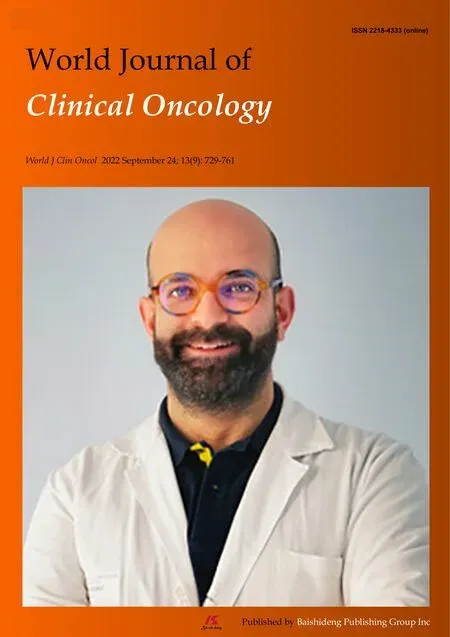Neoadjuvant immunotherapy in non-small-cell lung cancer:Times are changing—and fast
Carlos Aguado,Unai Jiménez Maestre,Xabier Mielgo-Rubio
Carlos Aguado,Department of Medical Oncology,Hospital Universitario Clínico San Carlos,Madrid 28040,Spain
Unai Jiménez Maestre,Department of Thoracic Surgery,Hospital Universitario Cruces,Barakaldo 48903,Bizkaia,Spain
Xabier Mielgo-Rubio,Department of Medical Oncology,Hospital Universitario Fundación Alcorcón,Alcorcón 28922,Madrid,Spain
Abstract Recent data from a phase 3 trial have shown that the addition of immunotherapy to neoadjuvant chemotherapy improves event-free survival in patients with nonsmall-cell lung cancer (NSCLC). This is the first positive phase 3 trial in this setting,although several phase 3 trials are currently investigating the efficacy of neoadjuvant and adjuvant immunotherapy in resectable NSCLC.
Key Words: Neoadjuvant; Immunotherapy; NSCLC; Perioperative; Checkmate-816; nivolumab; Chemo-immunotherapy
TO THE EDITOR
The management of localized non-small-cell lung cancer (NSCLC) is set to undergo an important change in the first few months of this year (2022) due to the recent publication of the second primary endpoint—event-free survival (EFS)—from the Checkmate-816 trial. The data show that the combination of chemotherapy + nivolumab yielded a mean disease-free survival of 31.6 m in the experimental armvs20.8 m [hazard ratio (HR): 0.63] in the control arm (chemotherapy alone),with a 2 year-EFS rate of 64%vs45%,respectively[1]. These results,in addition to previously reported results showing an improvement in pathological complete response (pCR) of 24%vs2%,confirm the combination of three cycles of chemotherapy + neoadjuvant nivolumab as the new standard of care in resectable NSCLC[2].
This is the first time that pCR has been validated as a surrogate marker for survival in a randomized trial. In the experimental arm,the median EFS was 26.6 m in patients without pCR and not reached in those with pCR (HR: 0.13). Although the results in terms of overall survival are still immature,a trend towards better survival was observed in the experimental arm,in which 12% more patients were alive at 2 years (HR: 0.57).
This new change in clinical practice comes with several questions that need be resolved in the next few years,including the following: The role of adjuvant therapy; the selection of the most suitable candidates; comparison with adjuvant chemoimmunotherapy; the optimal approach in stage I-II disease; standardization of pathological response assessment; changes in resectability criteria; and changes in the preoperative algorithm.
The perioperative management of NSCLC will undoubtedly undergo a major transformation in the coming years due to the arrival of targeted therapy in this clinical setting,mainly the incorporation of pre- or post-operative immunotherapy[3]. The CheckMate 816 study was the first phase 3 trial to report positive results for the addition of immunotherapy to neoadjuvant chemotherapy[1]. However,other ongoing phase 3 trials evaluating other PD-1 axis inhibitors are expected to report results soon,such as the Impower-030 trial (atezolizumab)[4],KeyNote-671 trial (pembrolizumab)[5],and the Aegean trial (durvalumab)[6] (Table 1). Likewise,atezolizumab has already obtained FDA approval for use in the adjuvant setting in patients with resected PD-L1 positive stage II-IIIA NSCLC[7],and positive results have also been reported from an interim analysis of the KeyNote-091 trial,showing the benefits of pembrolizumab in resected stage IB-IIIA NSCLC[8]. Nivolumab and durvalumab are also being evaluated in the adjuvant setting in several other phase 3 trials (ANVIL,NADIM-Adjuvant,Mermaid-1)[9-11] (Table 2). As a result,the panorama for the treatment of early-stage NSCLC is becoming increasingly interesting,and the data suggest that it will be crucial to personalize treatment to offer the best treatment scheme for each individual patient.
These new options bring hope of a cure to a greater number of patients,but also new challenges for the multidisciplinary team and other professionals involved in the treatment of these patients. Once again,coordinated multidisciplinary work will be essential,especially among medical oncology,thoracic surgery,and radiation oncology.

Table 1 Main phase 3 trials evaluating neoadjuvant chemoimmunotherapy in non-small-cell lung cancer

Table 2 Main phase 3 trials evaluating adjuvant immunotherapy in non-small-cell lung cancer
FOOTNOTES
Author contributions:Aguado C,Maestre UJ,and Mielgo-Rubio X wrote and revised the letter.
Conflict-of-interest statement:All authors declare no conflict of interests related to this article.
Open-Access:This article is an open-access article that was selected by an in-house editor and fully peer-reviewed by external reviewers. It is distributed in accordance with the Creative Commons Attribution NonCommercial (CC BYNC 4.0) license,which permits others to distribute,remix,adapt,build upon this work non-commercially,and license their derivative works on different terms,provided the original work is properly cited and the use is noncommercial. See: https://creativecommons.org/Licenses/by-nc/4.0/
Country/Territory of origin:Spain
ORCID number:Carlos Aguado 0000-0002-5624-8035; Unai Jiménez Maestre 0000-0001-5034-4723; Xabier Mielgo-Rubio 0000-0002-0985-6150.
S-Editor:Liu JH
L-Editor:A
P-Editor:Liu JH
 World Journal of Clinical Oncology2022年9期
World Journal of Clinical Oncology2022年9期
- World Journal of Clinical Oncology的其它文章
- Factors predicting upstaging from clinical N0 to pN2a/N3a in breast cancer patients
- Whipple’s pancreaticoduodenectomy at a resource-poor,low-volume center in Trinidad and Tobago
- Hyperprogression under treatment with immune-checkpoint inhibitors in patients with gastrointestinal cancer:A natural process of advanced tumor progression?
